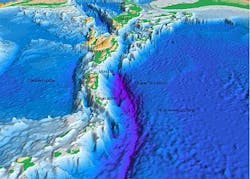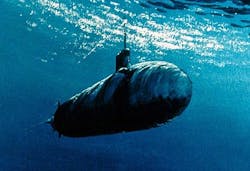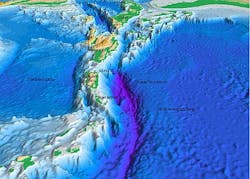Precise underwater navigation with sonar is aim of Navy research contract to Penn State
ARLINGTON, Va., 7 Oct. 2012. Researchers at Penn State University in University Park, Pa., are designing a sonar-based underwater navigation system for the U.S. Navy that will enable submarines and unmanned underwater vehicles (UUVs) maintain position underwater safely by following known ocean-floor terrain features.
This technology, called bathymetric navigation with sonar, matches sonar images of terrain below the undersea vehicle to known terrain maps of the ocean bottom. This approach is similar to how an airplane pilot navigates under visual flight rules (VFR) matching what he sees below the aircraft to aviation maps.
The Office of Naval Research (ONR) in Arlington, Va., awarded a $1.2 million contract Thursday to the Applied Research Laboratory at Penn State for the Broadband Navigation Sonar System program, which seeks to develop a bathymetric underwater navigation device, which could be applicable to submarines, UUVs, and other subsurface vessels.
The contract is part of an ONR research solicitation issued originally in 2010 entitled Navigation and Timekeeping Technology, which seeks to develop affordable and reliable precision navigation and timing systems for situations in which the Global Positioning System (GPS) satellite navigation network is not available -- such as when operating underwater.
The lack of precise navigation and timekeeping technologies as alternatives to GPS may jeopardize the success of military operations, ONR researchers point out.
The ONR Navigation and Timekeeping Technology program seeks to develop new navigation technologies that will provide more accurate, reliable, maintainable, and affordable systems for naval aircraft, surface warships, submarines, UUVs, and fixed-site installations in the absence of GPS signals.
The non-GPS Navigation Technology component of the Navigation and Timekeeping Technology program -- for which the Penn State Applied Research Laboratory won this contract -- seeks to develop a small, portable quantum physics-based gravimeter/accelerometer for underwater navigation application; a bathymetric underwater navigation device by sonar and light detection and ranging (lidar); and precise navigation in littoral sub-surface and surface navigation using various sensors such as sonar, radar, and lidar.
The the Penn State Applied Research Lab is expert in technologies for acoustics, guidance and control, thermal energy systems, hydrodynamics, hydroacoustics, propulsion, materials and manufacturing, navigation and GPS, communications, and information.
The lab develops gyroscopes, accelerometers, gravimeters, gradiometers, speed sensors, inertial navigators, geophysical navigation, radio and satellite navigation systems, celestial navigation systems, and integrated navigation systems.
The lab's navigation expertise extends to inertial navigators; gyrocompasses; GPS; passive navigators; gravity and terrain estimation systems; magnetic navigation systems; bathymetric navigation systems.
Bathymetric maps also use a digital terrain model and artificial illumination techniques to show ocean depths and subsurface topography.
For more information contact the Penn State Applied Research Lab online at www.arl.psu.edu, or the Office of Naval Research at www.onr.navy.mil.
Follow Military & Aerospace Electronics and Avionics Intelligence news updates on Twitter


